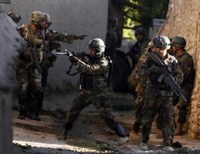Last weekend’s dispatch of U.S. special operations units on missions into Tripoli, Libya, and Barawe, Somalia, to capture leading terrorist figures, building on earlier operations such as the 2011 mission that led to the death of Osama bin Laden, reflects an ongoing shift in the Obama administration's willingness to risk U.S. casualties as well as deal with possible diplomatic incidents in order to go after high-value targets in the war on terror. It is a marked contrast to the unwillingness during the Clinton administration, prior to 9/11, to countenance possible losses or to insert American operatives on the ground in Afghanistan to eliminate al-Qaida leaders.
In particular, the willingness to violate Libyan sovereignty to seize Nazih Abdul-Hamed al-Ruqai, who masterminded the 1998 embassy bombings, and to bypass a post-Gadhafi government that has been characterized as a strategic partner of the United States further confirms that the United States is moving to adopt a new norm of “conditional sovereignty” in international relations. In contrast to states like Russia and China that continue to insist on the robust defense of state sovereignty, the U.S. approach, as Amitai Etzioni notes in the current issue of the Stanford Journal of International Law, is based on the recognition of the “fading of the old world of national borders.” In particular, this approach recognizes that events in one state rarely remain confined to its own territory but spill out to affect other countries and even potentially the global system as a whole.
Conditional sovereignty acknowledges that states must discharge certain responsibilities in order to enjoy the rights of sovereignty. Already, we have two categories of responsibilities that are in their first stages of development. The first, the so-called responsibility to protect (R2P), calls on governments to take steps to prevent the deaths of large numbers of the population under their stewardship—although the triggers for determining when a state has failed in its responsibility to its citizenry remain undefined and subject to controversy, as the deadlock in the U.N. Security Council over the Syrian civil war has demonstrated. The second is the responsibility to prevent the use or proliferation of weapons of mass destruction. The viability of this second issue is also now being tested in Syria, as the world looks to see whether the agreement reached in Geneva last month between Secretary of State John Kerry and Russian Foreign Minister Sergei Lavrov, subsequently codified in U.N. Security Council Resolution 2118, can lead to the successful location and destruction of all of Syria's chemical weapons by 2014.

